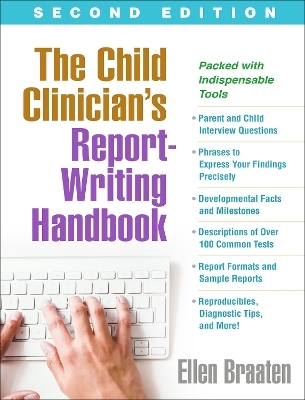
The Child Clinician's Report-Writing Handbook, Second Edition
Guilford Press (Verlag)
978-1-4625-4069-3 (ISBN)
New to This Edition
*Revised throughout for DSM-5 and ICD-10-CM.
*Includes the most current test batteries and rating scales.
*Updated resources for professionals and parents.
*Reproducible materials now available online.
Ellen Braaten, PhD, is Director of the Learning and Emotional Assessment Program at Massachusetts General Hospital (MGH), Co-Director of the Clay Center for Young Healthy Minds at MGH, and Associate Professor of Psychology at Harvard Medical School (HMS). She has been affiliated with MGH and HMS since 1998. Dr. Braaten is widely recognized for her expertise in pediatric neuropsychological and psychological assessment, particularly in the areas of assessing learning disabilities and attentional disorders. Her research and numerous publications focus on attention-deficit/hyperactivity disorder, learning disabilities, gender and psychopathology, intelligence, and assessment. She has published numerous books for professionals and parents, including Bright Kids Who Can't Keep Up.
Introduction
I. Questions for Conducting a Psychological Evaluation of a Child or Adolescent
1. Beginning the Interview
2. Questions for Parents on Signs, Symptoms, and Behavior Patterns
3. Observation Procedures and Questions for Children and Adolescents
4. Questions for Teachers or Other Professionals
5. The Formal Mental Status Exam with Children and Adolescents
6. Ending the Interview
II. Standard Terms and Statements for Wording Psychological Reports
7. Beginning the Report
8. Reasons for Referral
9. History of Current Symptoms
10. Medical and Psychiatric Background Information
11. Developmental and Family History
12. Academic and School History
13. Behavioral Observations
14. Attitude toward Testing
15. Affective Symptoms and Mood/Anxiety Disorders
16. Childhood Behavioral and Cognitive Disorders
17. Home and Family
18. School
19. Social and Work Relationships, Recreational Activities
20. General Guidelines for Presenting Test Results in a Report
21. Tests of Intellectual Functioning
22. Achievement Measures
23. Tests of Language Functioning
24. Memory Tests
25. Tests of Visual–Spatial and Motor Skills
26. Measures of Executive and Neuropsychological Functioning
27. Measures of Emotional and Personality Functioning
28. Behavior Rating Scales and Tests of Adaptive Functioning
29. Diagnostic Statements/Impressions
30. Summary of Findings and Conclusions
31. Recommendations
32. Closing Statements
III. Special Circumstances and Useful Resources
33. Writing for the Schools
34. Treatment Planning
35. Report Formats and Sample Reports
36. Resources for Professionals
37. Resources for Parents
38. Medications
39. Abbreviations in Common Use
40. Useful Forms
| Erscheinungsdatum | 31.08.2019 |
|---|---|
| Reihe/Serie | The Clinician's Toolbox |
| Verlagsort | New York |
| Sprache | englisch |
| Maße | 203 x 267 mm |
| Gewicht | 840 g |
| Themenwelt | Geisteswissenschaften ► Psychologie ► Entwicklungspsychologie |
| Medizin / Pharmazie ► Medizinische Fachgebiete ► Psychiatrie / Psychotherapie | |
| ISBN-10 | 1-4625-4069-4 / 1462540694 |
| ISBN-13 | 978-1-4625-4069-3 / 9781462540693 |
| Zustand | Neuware |
| Informationen gemäß Produktsicherheitsverordnung (GPSR) | |
| Haben Sie eine Frage zum Produkt? |
aus dem Bereich


